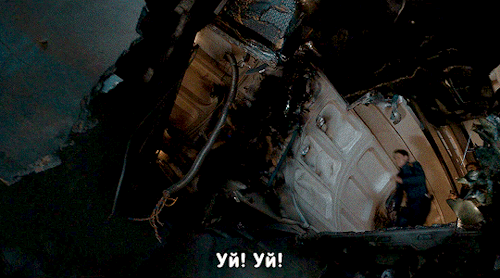I Was Watching Evening Urgant As Usual And I Just Couldn’t Resist Translating This Funny Bit For You.
I was watching Evening Urgant as usual and I just couldn’t resist translating this funny bit for you. What is Ivan talking about? Беляш, беляши — bel’ash (sing.), bel’ashi (plur.) Bel’ash is a dish of Kazakh, Bashkir and Tatar cuisine. It’s practically the same as a regular pirozhok with meat. Except the recipes and the forms of the dishes are a bit different.
P. S. Please let me know if you want me to keep tranlsating fun parts from Russian TV shows and wether or not the Russian subtitles above the screen are comfortable for you to watch/are necessary. Thanks for reading my little blog :)
More Posts from Eto-ena and Others
Tik tok by: @afedoor
RUSSIAN TEA VOCAB/ ALL THE NUANCES EXPLAINED

ча́й - the drink itself and a product in the store
ча́йная зава́рка or simply зава́рка - dry tea leaves in the packaging
ча́йный паке́тик - teabag
крупнолистово́й чай - whole-leave grade of tea
чаи́нка (the plural form чаи́нки is more common since usually there is more than one of them in your tea) - fannings, wet pieces of tea leaves or tea dust which fell into the tea
де́лать чай - to make tea. The construction is widely used and describes the process of making tea from any tea product i.e. leaves, tea bags.
ста́вить ча́йник - put on a kettle It is not common to say включи́ть чайник
поста́вь ча́йник = поста́вь во́ду - boil some water in kettle (usually for the tea)
я уже́ поста́вила ча́йник, ско́ро бу́дем пи́ть чай - I’ve already put the kettle on, we’ll have tea soon
зава́ривать (чай) - to brew. One of the steps of the process of tea making (usually from whole-leave grades of tea) when tea leaves are poured with hot water and left for a few minutes in the teapot. The process requires time as tea leaves need time to release natural chemicals. When it is happening the Russians say чай зава́ривается, i.e. the tea is being brewed.
зава́ривать ка́шу (to cook kasha) = to cause a situation that brings about troublesome or unpleasant consequences ну и ка́шу же ты завари́л! - what a mess you’ve made!
but! вари́ть ка́шу = to cook kasha
наста́ивать (чай) - to infuse. The idea of the process of настаивание is to wait longer than usual so the taste becomes strong enough. This verb can be used to explain the same process while preparing herbal teas and infusions.
Remember that this verb has two meanings!!! наста́ивать - to insist
подожди́, чай ещё не завари́лся = подожди́, чай ещё не настоя́лся - wait, the tea is not brewed yet
остужа́ть (чай) - to cool the tea down
электри́ческий чайник/электроча́йник - electric kettle
зава́рочный ча́йник - teapot
ча́шка = кру́жка - cup/mug traditionally ча́шка is the elegant cup with a special design, usually a part of a tea set. Кру́жка (mug) usually has a shape of a cylinder and larger than a regular cup. Now the differences are almost forgotten so you can use any word of your choice when you talk about tableware. But! It is always ча́шка/ча́шечка чая - a cup of tea
блю́дце - saucer
ча́йная ло́жка - teaspoon
ча́йный серви́з - tea set
моло́чник - milk jug
са́харница - sugar bowl
чай с са́харом (мёдом, варе́ньем, молоко́м, лимо́ном) - tea with sugar (honey, jam, milk, lemon)
#russian



🌸🌸
hottest language learning tip
write a diary
literally
just write a diary, it has helped me sooo much and i dare say it has been the most developing thing i’ve done while learning french, nothing else compares
1. you’re exposed to the language daily
2. you quickly see which words are missing from your vocabulary
3. you learn to write about the things you think about a lot
4. learning to actually think in your target language
5. having to look up words and when reading the entry back a couple of days later you can’t even remember which words you didn’t know
6. going back to the earlier entries and seeing all the mistakes and knowing how much better you’ve become
7. when you’ve been writing for a few months and your target language becomes a natural way for expressing yourself
8. when you’ve been writing for a few months and you start seeing the diary writing as a way of self-expression and stressrelief, and the language learning aspect becomes natural and secondary
9. filling out a whole book using only your target language and physically seeing how much you’ve accomplished
Ladies and gentlemen, Alexander Rusakov as Russian Levi. You're welcome.

My boyfriend woke up from a nightmare last night, got up from our bed, took his laptop and launched chess. Half asleep, he was silent the whole time, thinking of his moves. When he finally won against the computer he calmed down and explained with relief: "I saw a dream where I became dumb..."
Source: https://vk.com/pn6

— Why do you always put parentheses in messages? — I feel more comfortable with them)) — What do you mean? — Parentheses look like they are hugging words and they become kinder))




“There are certain things in the movie that are very Russian that is difficult for an American audience to pick up on. Like when [Kirk and Sulu] freefall and I capture them and I say something in Russian….[says Russian phrase]…it means “Oh man!” basically, which is something I ad-libbed. Which goes back to what I was saying. Chekov never speaks Russian in the series, and that was Russian slang. And that that is something I decided to add just for the hell of it, because JJ [Abrams] said ‘throw in some Russian, let’s do it for fun.’ It was just a moment that needed some kind of reaction, and they loved it out there. It is one of those things that Russian people get. I think Russian people are very happy with Chekov because he is one of the few Russian characters in American pop culture history that is not the Red Dawn kind of Russians.” — Anton Yelchin
Just a fun fact #6
Some more slang!
"Mi mi mi" (Ми-ми-ми) is used to describe something incredibly cute.
Example:
Этот котенок просто ми-ми-ми! - This kitten is just so mi mi mi!
Fun facts:
A Russian late night talk show 'Evening Urgant' has a rubric called 'mi mi mi', where the host of the show 'interviews' cute animals.
'Mi Mi Mi' is a song by the Russian band Serebro. You must have heard it. The thing is, sometimes online lyrics sites write 'mi' as 'me', which is obviously incorrect. But now you know :)
-
 moonxskies-blog liked this · 1 year ago
moonxskies-blog liked this · 1 year ago -
 spcknight reblogged this · 3 years ago
spcknight reblogged this · 3 years ago -
 sevenclocks liked this · 3 years ago
sevenclocks liked this · 3 years ago -
 learningrussian reblogged this · 3 years ago
learningrussian reblogged this · 3 years ago -
 imsotiredcanipleasegetabreak reblogged this · 3 years ago
imsotiredcanipleasegetabreak reblogged this · 3 years ago -
 imsotiredcanipleasegetabreak liked this · 3 years ago
imsotiredcanipleasegetabreak liked this · 3 years ago -
 tsukumogamipederusatu liked this · 3 years ago
tsukumogamipederusatu liked this · 3 years ago -
 gazmatic liked this · 3 years ago
gazmatic liked this · 3 years ago -
 chthonianfloats liked this · 4 years ago
chthonianfloats liked this · 4 years ago -
 theycallmewhatt liked this · 4 years ago
theycallmewhatt liked this · 4 years ago -
 76historylover liked this · 4 years ago
76historylover liked this · 4 years ago -
 just-a-leech-boy liked this · 4 years ago
just-a-leech-boy liked this · 4 years ago -
 fortheloveofspanglish liked this · 4 years ago
fortheloveofspanglish liked this · 4 years ago -
 claytoncausey liked this · 4 years ago
claytoncausey liked this · 4 years ago -
 witchywitchbitch liked this · 4 years ago
witchywitchbitch liked this · 4 years ago -
 salsa-and-light liked this · 4 years ago
salsa-and-light liked this · 4 years ago -
 livingforlanguages reblogged this · 4 years ago
livingforlanguages reblogged this · 4 years ago -
 livingforlanguages liked this · 4 years ago
livingforlanguages liked this · 4 years ago -
 dsmsix liked this · 4 years ago
dsmsix liked this · 4 years ago -
 eto-ena reblogged this · 4 years ago
eto-ena reblogged this · 4 years ago -
 ropuszysko liked this · 4 years ago
ropuszysko liked this · 4 years ago -
 kitkatsnow liked this · 4 years ago
kitkatsnow liked this · 4 years ago -
 appleinducedsleep liked this · 4 years ago
appleinducedsleep liked this · 4 years ago -
 blumoonwolf liked this · 4 years ago
blumoonwolf liked this · 4 years ago -
 darkeyessadeyes liked this · 5 years ago
darkeyessadeyes liked this · 5 years ago -
 pickylxve liked this · 5 years ago
pickylxve liked this · 5 years ago -
 house-enjoyer liked this · 5 years ago
house-enjoyer liked this · 5 years ago -
 eto-ena reblogged this · 5 years ago
eto-ena reblogged this · 5 years ago -
 gay-gay-crochet liked this · 5 years ago
gay-gay-crochet liked this · 5 years ago -
 sciencelostinsilence liked this · 5 years ago
sciencelostinsilence liked this · 5 years ago -
 bigboibolshephile liked this · 5 years ago
bigboibolshephile liked this · 5 years ago -
 hjhb-the-hdgp reblogged this · 5 years ago
hjhb-the-hdgp reblogged this · 5 years ago -
 openedlore liked this · 5 years ago
openedlore liked this · 5 years ago -
 fandomandtravels reblogged this · 5 years ago
fandomandtravels reblogged this · 5 years ago -
 wefewwehappyfew liked this · 5 years ago
wefewwehappyfew liked this · 5 years ago -
 shinylitwick94 reblogged this · 5 years ago
shinylitwick94 reblogged this · 5 years ago -
 shinylitwick94 liked this · 5 years ago
shinylitwick94 liked this · 5 years ago -
 puck-monger-99 liked this · 5 years ago
puck-monger-99 liked this · 5 years ago -
 artfullheart liked this · 5 years ago
artfullheart liked this · 5 years ago -
 dostcevski reblogged this · 5 years ago
dostcevski reblogged this · 5 years ago -
 perpulchra liked this · 5 years ago
perpulchra liked this · 5 years ago -
 corecataclysm liked this · 5 years ago
corecataclysm liked this · 5 years ago

actually, we don't call it russian, we simply call it cheeki-breeki
106 posts